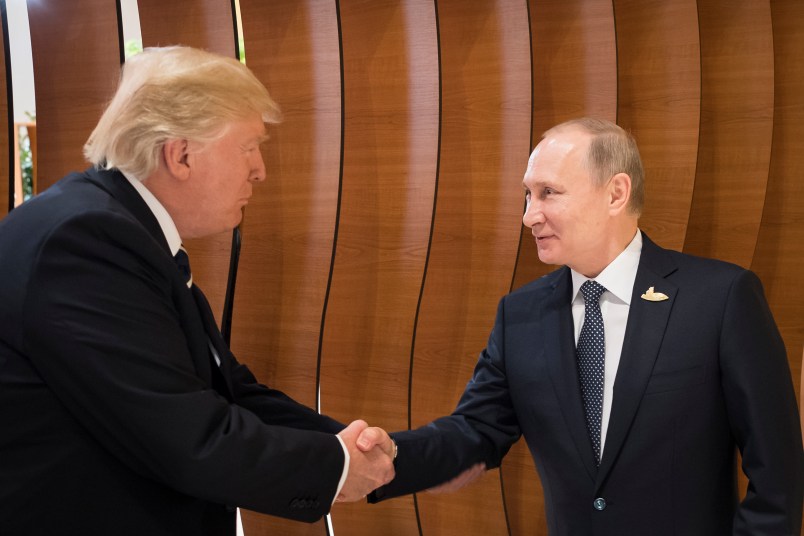WASHINGTON (AP) — President Donald Trump’s persistent overtures toward Russia are placing him increasingly at odds with his national security and foreign policy advisers, who have long urged a more cautious approach to dealing with the foreign adversary.
The uneasy dynamic between the president and top aides has been exacerbated by the revelation this week of an extended dinner conversation between Trump and Russian President Vladimir Putin at the recent summit in Germany. The previously undisclosed conversation, which occurred a few hours after their official meeting, raised red flags with advisers already concerned by the president’s tendency to shun protocol and press ahead with outreach toward Russia, according to two U.S. officials and three top foreign officials.
The officials were not authorized to publicly discuss private conversations and spoke on condition of anonymity.
Deep divisions are increasingly apparent within the administration on the best way to approach Moscow in the midst of U.S. investigations into Russian meddling in the American presidential election. Trump has repeatedly cast doubt on the conclusion of U.S. intelligence agencies that the Russian government sought to tip the election in his favor and has dismissed investigations into the possibility of collusion between his campaign and Moscow as a “witch hunt.”
Meanwhile, he has pushed for cooperation between Moscow and Washington on various matters, including the raging conflict in Syria.
But some top aides, including National Security Adviser Gen. H.R. McMaster, have been warning that Putin is not to be trusted. An intelligence officer-turned-politician, Putin is known for steering discussions in his own favor.
The three foreign officials who have spoken with top Trump advisers described a disconnect, or “mixed signals,” between Trump and his team over Russia, highlighting a lack of a clear policy. U.S. officials echoed that sentiment, with one saying diplomats and intelligence officials were “dumbfounded” by the president’s approach, particularly given the evidence of Russia’s election meddling.
McMaster expressed his uneasiness over Trump’s course to foreign officials during the lead-up to his trip to Germany. The general specifically said he had reservations about Trump’s decision to hold an Oval Office meeting in May with top Russian diplomats and with the president’s reluctance to speak out against Russian aggression in Europe, according to the three foreign officials.
McMaster and other national security aides also advised the president against holding an official bilateral meeting with Putin.
In a highly unusual move, McMaster did not attend the meeting with Putin. Only Trump, Secretary of State Rex Tillerson and a translator made up the U.S. side.
Meetings with such critical national security implications typically include a broader team, including the national security adviser and a regional specialist from the National Security Council — in this case, the head of the Russia directorate, a position recently filled by Russia expert Fiona Hill.
Foreign and U.S. officials said the Russians recommended that a note taker be present in the bare-bones official meeting. But Trump, who has repeatedly expressed concern over leaks, refused, instead relying on Tillerson to document the meeting. The session was scheduled for 30 minutes but stretched to more than two hours.
The White House did not respond to questions about Trump’s refusal to have a note taker for his meeting with Putin, or about whether McMaster communicated his concerns to the president.
The formalities and discipline of diplomacy have been a rough fit for Trump, whose reputation as a businessman was that of a freewheeling, impulsive dealmaker.
As for his dinnertime conversation with Putin, unofficial discussions between world leaders over dinner do not violate protocol. But it is unusual and can be risky for a president to speak directly to Putin without a U.S. translator present. He was forced to rely on Russia’s interpreter for the discussion, which reportedly went on for nearly an hour.
“The Russian interpreter probably interpreted very clearly, but the problem is there’s no record of the discussion on the American side,” said Steven Pifer, a former U.S. ambassador to Ukraine. It would have been wise for Trump to have his interpreter take notes so there would be a record, he said.
White House spokeswoman Sarah Huckabee Sanders was dismissive of the controversy surrounding the Trump-Putin dinner chat, blaming it on a “Russia fever” gripping the media.
She said other presidents, including Barack Obama, had similar informal conversations.
“To act as if this were some secret is absolutely absurd,” she said.
Trump addressed his earlier, official meeting with Putin in an interview with reporters last week onboard Air Force One. The president said he repeatedly confronted Putin on reports of Russia’s election meddling — interference that Putin staunchly denies. But Trump would not say whether he believed Putin’s denials, as the Russian president claimed.
White House officials said the public may never know what was discussed between Putin and Trump over dinner. But advisers past and present said that characterizing any conversation with Putin as casual would be a mistake.
“There are no meaningless conversations between presidents,” said Jeffrey Edmonds, the NSC’s former Russia director.
“That’s what is so divergent here,” he said. “Relations have been at an all-time low because of Russian meddling in our elections and so it’s hard to see how a meeting with President Putin for an hour during dinner isn’t important.”







Yeah it is just a mystery why Trump would be all chummy with Putin after he meddled in our election to get Trump elected. Completely inexplicable.
Politico has an interesting story from a longtime Republican operative on How the GOP Became the Party of Putin